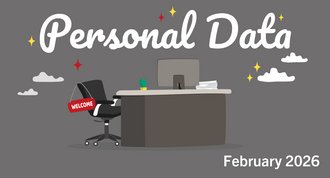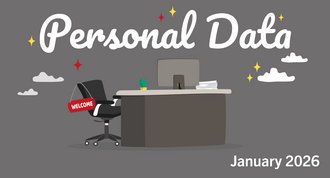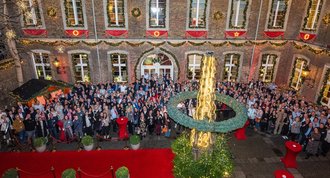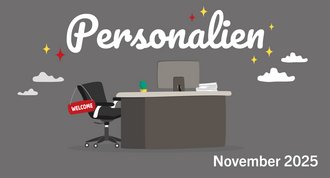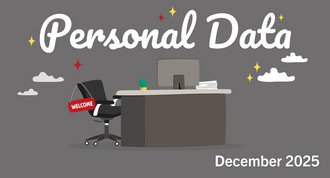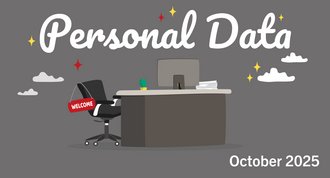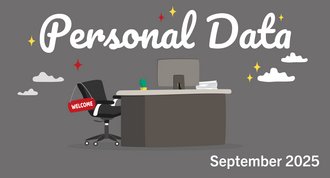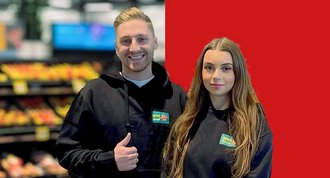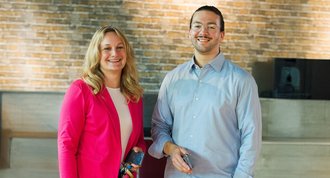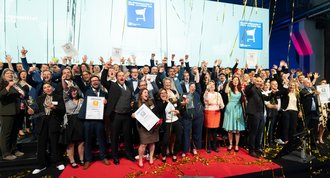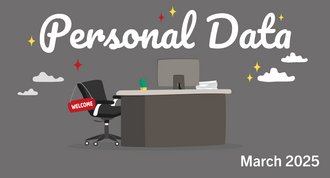
On the side and yet right in the middle of things - this is how Sonja Krüll-Murawski and Markus Pluta organised their Job Swop. The former benefited from her colleague's many years of experience in her day-to-day work as a Business Administration speaker. The agile coach, on the other hand, was delighted with Krüll-Murawski's view from the outside and her feedback in everyday life.
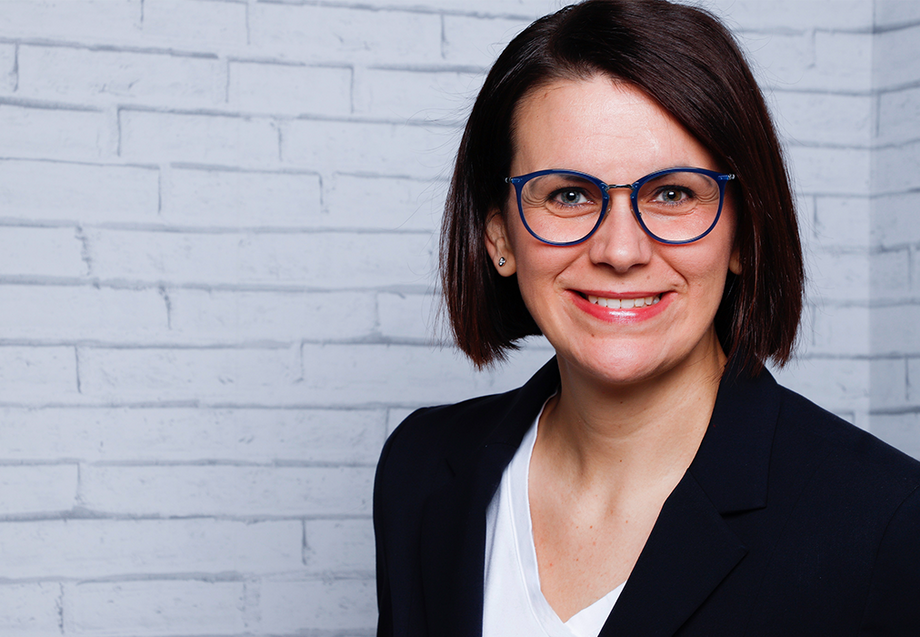 Sonja Krüll-Murawski
one: Sonja, Markus: How did you actually find each other for this Job Swop experience?
Sonja Krüll-Murawski
one: Sonja, Markus: How did you actually find each other for this Job Swop experience?
Markus Pluta: I'll say it like my children: Sonja did it!
Sonja Krüll-Murawski: Yes, exactly. I need to expand a little: Over the last few years, I have developed further in the direction of workshop facilitation, team coaching and organising retrospectives. Retros or retrospectives are team meetings where the aim is to learn from past experiences for future projects.
In the course of this further development, I read the flyer about our internal Job Swop programme and met Markus. He gave me the impression that his approach to these topics could help me move forward. I thought about it a bit, picked up the phone and asked Markus if he would be interested in a Job Swop..
Sonja Krüll-Murawski has been working as a consultant in the Business Administration holding division for over four years.
At the time of the job swap, Markus Pluta was working as an Agile Coach at toom Baumarkt DIY store. Since April 2023, he has been a Senior Project Consultant and Manager in the Holding's Business Administration division.
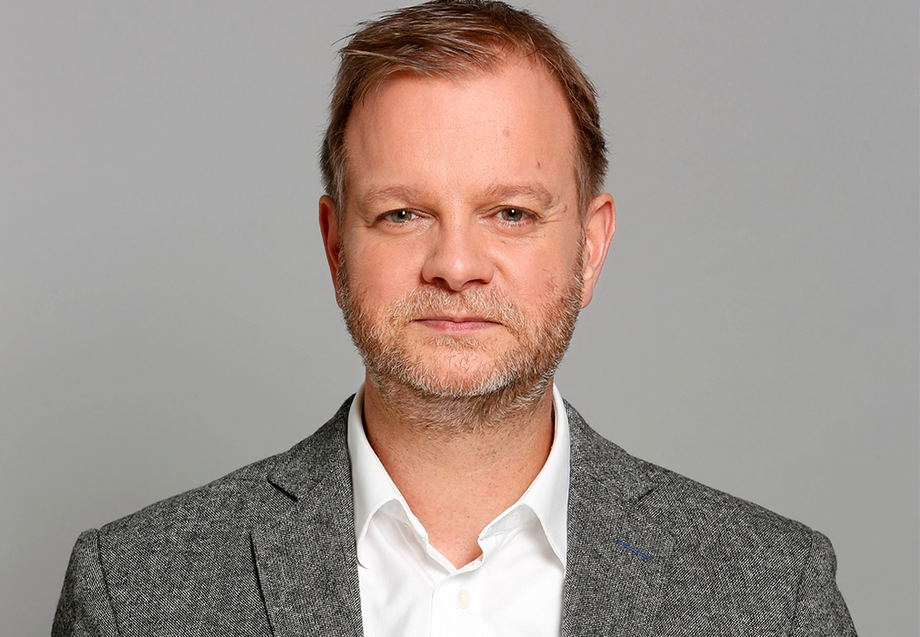 Markus Pluta
Markus Pluta
Markus Pluta: Of course, I didn't know what the term job swop meant, I was familiar with job shadowing. But for me, behaviours like participating, getting involved and being open are the order of the day. That's why I said to Sonja straight away: 'Yes, of course, of course'. We already knew each other, so I realised that I wouldn't turn down the question. Especially as - and this is the great thing about Job Swop for me - both sides benefit.
one: In what way do both sides benefit from a Job Swop?
Markus Pluta : Because Sonja gave me intensive feedback after every joint appointment. You don't get that in normal everyday life, and I benefited a lot from that.
one: After the 'Yes, of course, of course': How did you then proceed in concrete terms? Did you have to convince your senior managers?
Sonja Krüll-Murawski: In our first phone call, we had already established what the expectations were and whether they could be met at all... It quickly became clear that it was possible.
Then we looked at the conditions: It was summer 21, in the middle of the pandemic. And we were both very busy. So the whole thing had to run alongside our day-to-day work - and completely virtually.
That's when Markus had a good idea: he checked his diary for dates that made sense for me and invited me to join him. So we organised the Job Swop not by days, but by dates. That was great. Our two superiors also liked this approach.
„It was a real benefit for me, I was able to take a lot with me for my area.“

one: Appointment-based work shadowing is a model that many people could certainly imagine for whom a fixed period of time cannot be organised. How did you set these dates?
Markus Pluta: We looked at my diary together: What appointments do I have in the planned period, where does Sonja want to be, what makes sense? We discussed the dates in advance and then took some time to discuss them again afterwards ..
one: Why don't you give us an example?
Sonja Krüll-Murawski : I learnt how to carry out a retro from Markus. He had retro appointments with some of the toom teams and got their agreement in advance for me to join them. A yes made us happy, a no would have been completely okay, we didn't want to overrun anyone. And then I watched Markus guide us through the retro. I know this from theory, but it was a real learning process for me to see how he does it in practical interaction with his colleagues, for example how he reacts to things that happen during the course of the conversation. It was a real benefit for me and I was able to take a lot from it for my area, as this is a very important topic for us.
one: Markus, where was your "profit" here?
Markus Pluta: I involved Sonja in the preparation of a regular lecture series at toom. That was a benefit, she put a lot of thought into it and took a lot of work off my hands, I could sort of sit back and relax..
„Different perspectives bring different impulses to the work.“

one: That means their impulses as a "job swop taker" bring something to you as a "host"...?
Markus Pluta: Exactly, because different perspectives bring different impulses. Sometimes you have blinkers on, but the world is so colourful and diverse.
one: What qualities do you need as a host to be able to embrace this colourfulness, Markus?
Markus Pluta: I have to ask myself in advance: how shy am I about opening up my everyday working life to someone else? Do I perhaps have the feeling that someone is looking over my shoulder, seeing my mistakes or quirks? Then it's important to say: I accept that, I'm open to showing my desk.
one: And vice versa: Sonja, what do you bring with you to look at this desk? Listening attentively is probably not enough?
Sonja Krüll-Murawski: No, just listening is not enough. You definitely need openness, self-reflection and the will to learn. I often left the calls with Markus with a note containing a specific book title or a term that I didn't know. The challenge was to accept what I didn't know and then to research or ask about it. So you have to be curious.
one: How important was it for your job Swop that you knew each other in advance?
Sonja Krüll-Murawski: In my case, it started with the fact that I knew him professionally and knew that I could learn from him. I wanted to be able to do what he could do. If the personality and wavelength are right, it's a great package. We had that. You can certainly manage it even if you're not that close. But the professional aspect, i.e. that you can learn something, has to be there.
one: So you should first think about what you want. And then see where exactly you can find it? And not just set off with the idea: I want to see something different in the company.
Sonja Krüll-Murawski: I wouldn't recommend just setting off. And it would certainly be difficult to convince your line manager that way. A job swop has to be approached with the thought in mind: 'What's in it for me?
one: A good argument for superiors is certainly that Job Swop benefits the whole team. Looking back, was that the case for you, Sonja?
Sonja Krüll-Murawski: It was time very well spent. I've definitely developed the topics I mentioned at the beginning, I've facilitated even more workshops since then and I've got better at preparing and organising them. My line manager has mirrored this for me and for him, Job Swop is time well spent.
Markus Pluta: And as a further argument: what could be better than employees suggesting to their line manager that a particular development need could be solved by job shadowing? The costs are comparatively low, the network expands considerably... All this speaks in favour of job shadowing.
one: Sonja, what final tip do you have for anyone who is interested?
Sonja Krüll-Murawski: Do it. Get to grips with the idea. If it makes sense, then go for it. Because new impulses and challenges are always important in the working environment to avoid falling into "operational blindness". But: good to very good self-organisation is necessary, because the whole thing usually runs on top of your own job and is challenging, but manageable. And it's definitely a win-win situation for both sides. In short: I'm a fan.

